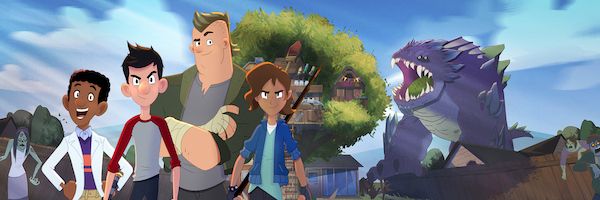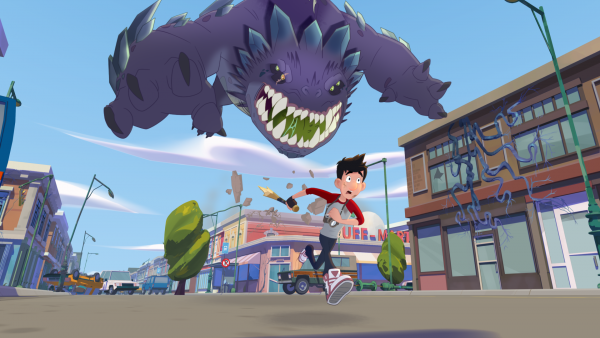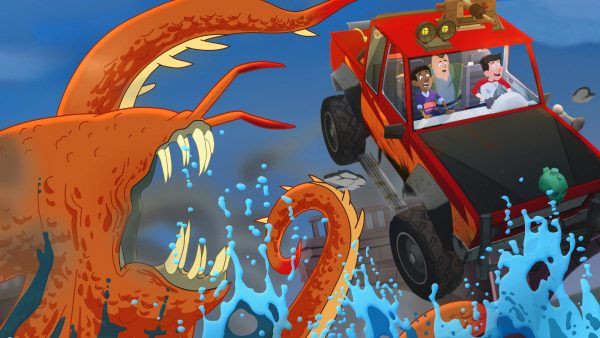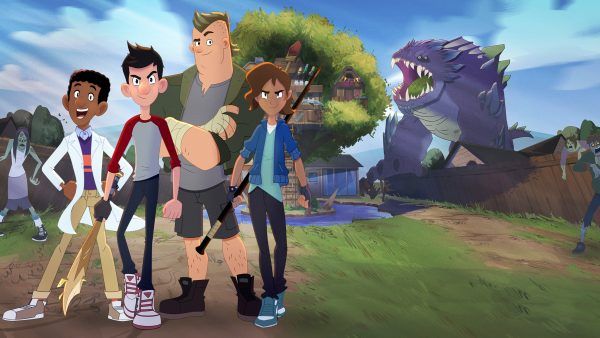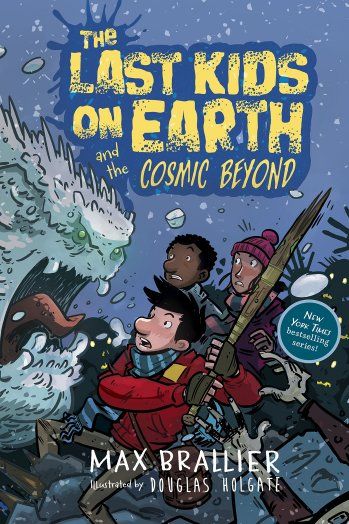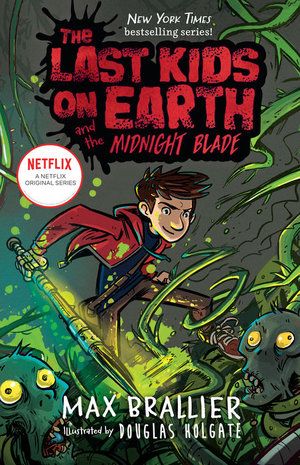The Last Kids on Earth brings Max Brallier's hit graphic novel series to life in a wonderfully animated adventurous epic that arrives on Netflix September 17th in a one-hour special. The series follows 13-year-old Jack Sullivan (Nick Wolfhard) and his band of middle-schoolers who live in a decked-out tree house, play video games, and battle zombies in the aftermath of the monster apocalypse. It’s a hilarious adventure filled with crazy gadgets and a lifetime supply of action, and it's just the first taste of what's to come in the new series from Atomic Cartoons.
In anticipation of the show's debut, I had a chance to chat with Brallier and co-showrunner Scott D. Peterson (Phineas and Ferb) about the process of bringing The Last Kids on Earth to the screen, making hard decisions about which moments from the books to include, and the unique style of animation that feels like the graphic novels brought to life. The duo revealed the plans for future seasons, or "Books", and confirmed that an original story is on the way in the form of an interactive special. Plus, guest stars Keith David, Mark Hamill, Bruce Campbell, and Catherine O'Hara's characters have been revealed. All that and more follows below.
Check out the official trailer for The Last Kids on Earth first, followed by our interview. And be sure to tune into Collider Weekly's animation podcast Saturday Mourning Cartoons tomorrow morning for our review of the series and another interview with star, Nick Wolfhard.
Spoilers ahead!
How did the opportunity to turn the books into an animated series originally come about, and at what point in the process did Netflix get involved?
Max Brallier: My daughter had been born a couple days earlier, and so I'd forgotten to check my email. I got an email from a guy named Matt Berkowitz who works at Atomic Cartoons, and they're the production company for Last Kids, and he had read the books and loved them, and I was very flattered. He wanted to sort of talk about if there had been any interest in doing an animated series. We got lunch at a lousy little diner down the street from me and we chatted for a long time about cartoons and what Atomic was doing, and then pretty soon after that we've kind of put together something more formal.
I was really excited about what they were doing, everything Atomic was saying, their take on the material, and I think maybe most importantly was their willingness and excitement to let me also be involved, do some writing and be involved in the creative side, and help sort of shape it; take the books and shape it into something new and different, but also the same in a good way. So we went around and pitched it, and it very quickly landed with Netflix. They were one of three or four places we pitched, and we sort of walked out of an hour long meeting like, "Wow, that went really well," and it did, and that's kind of what happened, I think. Yeah, that's it.
Scott Peterson: Well, apparently Netflix came about as close as possible to buying it in the room, but they decided, "We want to go straight into production. We don't even want to do any development on this." And so, they contacted me on a Friday, Matt from Atomic and Max, said, "Hey, can you come in on Monday to give us your take on this?" So I spent the weekend reading all the books and coming up with a pitch, and met with them. It was actually on my birthday, Halloween, and we met for about an hour and again, very quick within a couple of days, they said, "Great, we want you onboard." It was just a great match; I loved the material and the guys were great, and it very quickly became a team going straight into the production.
That's like a magical story. You never hear of a project coming together so seamlessly with so many different life events kind of tied into each other. It seems like just a magical formation story.
Brallier: Honestly... it's like with the birthday and my daughter being born, it's true. But the whole process has been a little bit like that, we've been very lucky in just... Wonderful people, and I think... I know it's my first experience with this, but it's been, I think, maybe relatively painless? Scott might totally disagree.
Peterson: We've had the normal production hiccups. But yeah, the team at Atomic is amazing, the folks with Netflix have been more than supportive, it's really been very good.
What were your first impressions when you got to see the final polished version of the show that's ready to go out to millions of fans out there?
Peterson: It's very impressive. It's hard to toot my own horn but the team at Atomic has just been amazing, and I think the show looks phenomenal. It's a combination of 2D and 3D that really works together seamlessly, so it's beautiful looking. The cast is amazing. I think it's a lot of fun to watch. It's scary in parts and it's funny in a lot of other parts, but I think it really comes across as just entertaining for pretty much everybody. It's geared for kids, but I think it's entertaining for adults as well.
Yeah, and you mentioned Atomic Cartoons a couple of times. I absolutely love the animation style, and the character and creature design in this world, so what was your discussion process like of finding that style, of choosing something that honored the original illustrations in the book but was a dynamic, kinetic, entertaining animated series as well?
Brallier: It was a lot of words of things that were very new to me, I didn't know anything about, but I can say just that early on we knew we wanted to maintain the look and feel and style of the books as much as possible, as much as made sense in translating it. But we wanted the characters to look the same, we wanted them to be recognizable. There's millions of books in kids' hands all over the world, and we wanted them to... If they saw the show or they saw an ad for the show, or whether it was a poster or something, we just wanted them to be recognizable that these are the same kids that they had fallen in love with when they read the books, or the same character that they enjoyed. So we wanted to maintain that, and then of course amplify that when possible with the tree house and Big Mama, and make that just really feel like epic, and the monsters feel epic but still feel the same.
Peterson: Yeah, we just felt like it felt like a 2D show to us, like traditional 2D animated show, but we also wanted to make it feel a little deeper and richer. So using some 3D backgrounds and some 3D props like... Big Mama is a car that they drive around in and actually becomes kind of a character in the show; we wanted it to really feel dynamic as it went around corners and things, so it felt like a little of the best of both worlds, to make the show with a combination of 2D and 3D.
Yeah, and I love Big Mama, too. I drive a Jeep, and my ultimate dream if I had all the money in the world is to outfit it like it's going through the zombie apocalypse. Maybe one day, but this is the closest I can have to that for right now, so that was great.
Peterson: There's a lot of wish fulfillment in the show in terms of Big Mama and all the gadgets, and the things that Quint can build, and the Ultimate Tree House of Awesomeness with all the different things. Max came up with this fantastic place for kids to live, so I think every kid would want to live in a giant tree house filled with weapons. It's great.
Oh my god, yeah, and I'm still a kid at heart. Everything that happens in this show went in Max's stories; it's like, "Yeah, that's exactly what I probably would have done if I was a kid," in my imagination in this world, so it was awesome.
Brallier: Yeah, that wish fulfillment has been a big thing from the beginning, just trying to capture that feeling of, man, if you had your whole hometown to yourself, and it's just you and your best buddies, and there were zombies everywhere and there are monsters and it was scary... But also there's adventure and it was also kind of fun, and you could kind of do whatever you want, what would you do? What if you became a hero? To try to capture all of that, grab all that and put it into one story has been the goal from the beginning, I think, in terms of... At least the special, starting with the special we've really, I think, we succeeded in our goal, I felt great about that.
Peterson: In the writers' room we coined the term "funpocalypse." It's the end of the world but they're trying to make the best of it, so that's really kind of a theme.
Yeah, this is probably the only post apocalyptic show I've seen that's actually fun. It's lighter, there's a lot of energy, there's dynamic things going on. Everybody's not just depressed and mopey and all the colors are drained out of the world, it's actually bright and fun, so I do appreciate that.
Brallier: Yeah, that was a big... The color thing was important. We talked about early on, that it should feel bright and... Just because it's the end of the world doesn't mean the sky wouldn't actually still be really blue, wouldn't be gray necessarily. It's like they should all pop; it feels like a playground, a place you want to go even though it is the end of the world.
Exactly. You mentioned it's not just the solo effort for our hero of the story who we're introduced to. He does kind of get to form an ensemble, his little hero group with all of his friends. I got a chance to speak to Nick [Wolfhard] earlier this week, but can you talk about the casting process and how you kind of landed on these core actors to play your foursome here?
Peterson: We were really lucky to find the cast that we did. Within an episode of two, they really gelled. Half the cast is in Canada and half the cast is in L.A., so we did dual recording sessions with the voice director up in Canada and myself, with Max, here in L.A.. But even without being in the same room, they really seemed to vibe off of each other and just became a core ensemble. We've got our celebrity casting for some of the monsters, but our core group really became a solid ensemble.
Max, how's that been for your to see your creations come to life, both as actors supplying voices and then animation?
Brallier: Looking at the finished product and the process, I've been really, really lucky. I think I've been lucky to have Scott. I'd never tell it to his face but we're on the phone, so... But maybe the biggest challenge for me as, taking it from books, where I was still involved heavily in making the book into a show, was like... Not just the literal voices of the characters; I had always imagined them in my head a certain way, and so it was just strange.
The strangest part was maybe when you did the auditions, and I sat down and listened to 40 different Jacks and 50 different Junes. It was like, "Wow, these are people..." There's a moment where I think it's incredible how many people are involved in this right now. It sort of blew my mind that there's people all over the place reading these sides, you're reading dialogue that we wrote, and that blew my mind. Then it was like, "Okay wait, that didn't sound like Jack. That doesn't sound like Jack. That sounds nothing like a Jack that I've imagined..." It was so in my head for years I've been writing these books, and so when we heard Nick's read it was just like, "Oh, that's Jack." It was such a wonderful feeling to not think I was crazy, and think that I did have a voice in my head that sounded like Jack and it existed out there in the wild, it was Nick.
It was the same thing for June, Dirk, and Quint, and just getting those actors... We've just been beyond lucky the whole way, and the way that they've sort of connected and to see them... I don't know, it's just been very fun to watch them together as actors as well.
Hopefully we have many more scenes ahead where we get to see them kind of grow as actors and as characters together on the show. When I got a chance to check out the first special, I was a little surprised. I didn't think it was going to be like a one-hour special that kind of encompassed the whole "getting the gang together" story, so was that always the plan or did that kind of evolve from an episodic plan at some point? How did that come together?
Peterson: There was talk initially about doing three episodes to start, and we felt like it really held together as a movie. We always wanted to do the first book over 10 episodes or something, because we feel like you really need to get the kids together. This is about Jack finding his family in the apocalypse and finding a family that he never had, and the sooner you get to that point it felt like... We didn't want to do eight episodes of Jack wandering around by himself. That's not what the show's about, so it was really important that we get that first book done and started, and get the whole universe moving in a special or the first few episodes.
Brallier: Yeah, we knew we wanted to take the first book... The first book is really like a sort of like an Avengers: They're assembling the team, and by the end... It starts off with one, and by the end you've got this team and they defeat the bad guy, and it's like mission accomplished. Then the world after that really sort of explodes and becomes much, much bigger, and we really wanted to get to that bigger world sooner rather than later but also sort of faithfully adapt that first book in the time-frame that made sense, and to sort of do it as a little movie really, really felt right.
Were there any moments from the first book that you were kind of bummed that maybe didn't make it in, or is there anything that you would have liked to see that you just didn't have the time for?
Brallier: Oh, I could go about ... let me find my list. No, I mean, nothing leaps out to me that it's like, "Oh, that didn't make it," and I think it's probably because... The first book, we were able to get a great deal of it in there and really faithfully adapt it, and then after that moving forward we were also able to sort of take what I had originally written and just do more. Here with the first book we were able to get so much into it, and there's no big thing that comes to mind, like, "Oh, we didn't get this big action or that big action scene, or that really funny back and forth that I loved or that piece of dialogue..."
If anything it's sort of the opposite, where like here we get to see June come to life a little bit more early on. We get to see her not totally just through Jack's eyes, but sort of through... the viewer gets to see her on their own, where the book is first person so everything is completely through Jack's head. So yeah, there's not one big one that jumps to mind. If there was I would say so, but I really can't think of one big thing.
Kind of on the flip side of that, did you guys have a favorite moment from that first episode that you could share with our listeners?
Peterson: As many times as I watch it, the finale constantly grabs me; that there's a big battle, and I really think it ramps up so well and I just... I could be watching it for the 50th time trying to get notes on some certain thing and I'd still get caught up in the excitement of it, so I really like the big finale.
Brallier: Something I kept trying to do in the book, and I remember Googling... It's really embarrassing. I would Google, "How do you write a movie montage but do it in a book?" They were like... I remember the responses I found online of... "That sort of sequence is really only a film technique, it doesn't work in book forms." I wrote, "This is a big montage moment," in the text of the book, and it says that... I think it's like, "Having fun in the school" montage, or something, and so in my head it was always... The book was supposed to feel and was written almost like TV, like film, and then just all of it, to see those moments come to life were really wonderful.
I think my favorite, though, is when Jack and Quint and reunited and it's this really emotional, wonderful moment, and then it jumps right into them revealing Big Mama, and there's the music and there's those cuts, and it just feels like a Bond movie for a second. When I was writing that, that's what I was picturing in my head, and then five years later or six years later, to see it is just... That blows my mind every time.
I love that montage note too, because it makes it feel kind of like an Edgar Wright / Scott Pilgrim kind of note there. It seems like something that they might have done, yeah.
Brallier: Yes, absolutely, and that's such a good influence, I think, on a lot of what we've done.
Yeah, there's a lot of pop culture touchstones scattered throughout even this first special. Was that something that you guys were conscious of, or just kind of cool ideas that came up during the process, or was that pulled directly from the books?
Peterson: In terms of style, we absolutely looked at Edgar Wright. That's something we kept talking about and using that, especially in the way we edited and quick, short cuts of things to get through some material. The books were really very pop culturally, we used a lot of pop references and we weren't able to use as many of those as we wanted, just for legal reasons, so we had to find other ways to feel like we were... Stylistically, we could do things, but no, we couldn't reference the name of a store or the name of a character. But we tried to still maintain that sensibility of it's happening in the here and now.
Brallier: Yeah, that was one of the things in the books where it was like... I wanted to... I guess, kids always ask me, "Why do you use real stores and stuff?" I wanted it to sort of feel, I don't know, real, at least real to my experience, my life experience or whatever. So you know, there's a big battle at Target and the opening scene takes place at a CVS pharmacy, and so that was maybe one... You asked earlier about things that hurt to lose; that was one where early on I felt like, "Oh no, if you can't call it that, that's going to be a problem," or "It's not going to feel the same." But then it became actually a really fun challenge and sort of exciting thing to almost do our own Simpsons sort of thing, where you get to do fun store names and parody things and make it feel real, and real to life, like these are true places, but also at the same time have fun with it, yeah.
In terms of, I think, intentional pop culture stuff, we certainly didn't have any sort of... "We got to make sure we hit three of these per episode," or anything like that, but there was... I think it sort of naturally, in terms of having things feel like an Indiana Jones scene or something, just came from all of our heads. So all the writers sort of were on the same page with that stuff, but just sort of naturally happened.
I love kind of creating your own pop culture things within the world, too, because then later on, somebody who grows up watching this show is maybe going to reference your show in the future, so it's kind of a nice cyclical thing you get to kind of feed into.
Brallier: Absolutely. I had that same thought, actually, after we started doing that. I was like, "Wait, I'm referencing stuff that saved my life and I loved watching when I was 10, 12, and 15. Oh wait, maybe..." It's like paying it forward or something; it's very cool in that way.
You've both kind of teased the future of this series, so I don't know if you can talk about it, if it's been revealed yet or not. But if there were to be renewals and more stories to come, would they be in this format like a one-hour special for each book, or are we expecting to see more episodic adventures in the future, if you can talk about that?
Peterson: Yeah, we're going into a more traditional episodic series where the second book becomes... We're not really calling them seasons, but we do the second book as 10 episodes, 22-minute episodes, and the third book is another 10 22-minute episodes. Then we have an original interactive episode at the end, so that's 66 minutes of original content as kind of a play-your-own adventure where you get to... That's an all original story where the kids go out looking for things for June's birthday, and that causes a lot more challenges than they might expect.
That's really cool. Now Max, forgive me, was that something that was pulled from the books as well, or was that an original thing that you had participated in putting together?
Brallier: The interactive, the concept, the plot, the idea for that, that was all original. I think Scott put together this sort of high-level idea for it, and then all the writers... We all sat around and talked it out like, "Okay, you're watching this and you can make your own decisions, so what's some of the mot fun things to choose, to make decisions about?" You don't want it to be like, do you go left or right here, you want it to be like, "Do you want to take Big Mama, or you get to scramble up the tree house and then leap off the edge?" You know, so what fun different things can you do, and so we all were involved in that process.
I love that because Black Mirror, episode "Bandersnatch", gives a lot of credit and headlines and talk about being an interactive episode, but honestly on Netflix, the animated series were doing that for years before they ever kind of showed up and did that. Because I'm an animation guy, I kind of have to put that hat on and say, "Well, animation did it first," so I'm glad you guys get a a chance to do that as well.
Peterson: Yeah, it was challenging but it's a lot of fun. I think it's going to be a standout episode for kids, because you can do things there... When you've got multiple endings, you can actually kill your characters, so...
Brallier: Jack could become a zombie. Finally, I can do that.
Yeah, that gives you a lot of freedom. That's a lot of fun to play with, and you get rewatchability, too, because everybody wants the new path forward that they get, or they get to pick the one that has the most twists and turns, yeah.
Peterson: Yeah, it should be a lot of fun.
You had briefly mentioned some of the bigger names, the more veteran actors who popped up in this show. At the end of the first episode, we get a tease from a new character, which we don't know if it's going to be maybe a villain or an ally? We don't really know yet, but I saw Keith David's name in the title credits. Can you maybe tease some of the cameos or actors who are coming to the show, either this season or next?
Peterson: Yeah, we do have Keith David playing Thrull. Don't want to say who or what Thrull is yet, and we have Mark Hamill playing Bartle, who's another one of the monsters. Catherine O'Hara plays a character named Skelka who doesn't appear as much in the books, but we really fell in love with her and started putting her in more and more episodes. Then we created a character named Shep, because we wanted to put Bruce Campbell in because we're all big huge Evil Dead fans, so that was an excuse to get him in the cast and he was great. I think those are our four big names at this point.
Max, how was that for you as a pop culture guy, having those names be involved with your series?
Brallier: It's still... I don't know, it's been a year or so maybe since we first began that voice process, and it still doesn't feel real. I mean, when we sat there and Mark Hamill was reading lines, some of them were taken directly from the book, and I was like... I was sitting in a really crappy coffee shop writing this book in New York City four years ago, and now Mark Hamill is reading lines for this dialogue. I remember I looked over at Scott, and we both were like little kids, and it's still just really so wonderful. I need to keep pinching myself, to the point where I probably have bruises on my thighs from all the pinching.
Last question for both of you guys today. What are you hoping that viewers get from The Last Kids on Earth?
Peterson: I'll say it, but I think Max will say it better. But I think we want them to get... in addition to just having a lot of fun, to get a sense of positivity that the end of the world isn't the end of the world, that there's still joy to be found in the world and it's a lot about the attitude that you take in looking at things. You can make the best out of anything.
Brallier: My thing's always just, I don't know, I would have lousy days at school or something like that, or you get into a fight with your buddy when you're in elementary school or middle school, and it's weird. You just want to come home sometimes and just relax and feel good with something, and I used to watch Star Wars, Indiana Jones, and things like that, and that feeling of escapism and sort of feeling like good about the world, about the world around you, because of entertainment is so important to me. I hope the kids sort of get that, and also that backyard adventure feeling of doing these things like that that I think get lost a little bit with film, and all that stuff.

